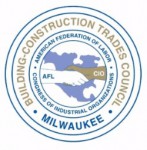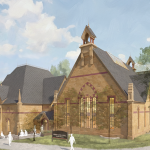Statement of Milwaukee Building and Construction Trades Council on Senate Bill 3 / Assembly Bill 24
Legislation would prohibit the state and all local governments from implementing a Project Labor Agreement or Community Workforce Agreement on public works projects.
MILWAUKEE – Dan Bukiewicz, president of Milwaukee Building and Construction Trades Council (MBCTC) and Oak Creek Alderman, released the following statement on the new bill that restricts local governments’ ability to require project labor agreements.
The use of a Project Labor Agreement can provide structure and stability to large construction projects. PLAs also help ensure compliance with laws and regulations governing workplace safety and health, equal employment opportunity and labor and employment standards. The coordination reached through PLAs can significantly enhance the economy and efficiency of construction projects.
“Project Labor Agreements are a win-win; they benefit businesses, workers and taxpayers. I’ve seen the track record in cities like Milwaukee – high quality work on projects done on time, on budget and good job and training opportunities that strengthen our communities.” Dan Bukiewicz, president of MBCTC and Oak Creek Alderman said. “Passing this legislation takes local control away from local communities.”
PLAs have been used successfully on private and public projects. The benefits of PLAs are clear, hundreds of private and public projects completed on time and on budget.
Some of the most respected institutions and businesses in Wisconsin have chosen to use PLAs: The Buck’s arena, Miller Park, Northwestern Mutual, Lambeau Field and Oak Creek Powerhouse with WE Energies. They use PLAs for one simple reason – they work.
“This legislation would deny local communities the ability to enter into PLAs and achieve the same benefits as private sector construction users.” Dan Bukiewicz, president of MBCTC and Oak Creek Alderman said. “PLAs have demonstrated and economic benefit to both private and public projects. Local municipalities should be able to utilize them if they deem them appropriate for their needs, and should not have the State over govern and take that option away. Local official are better aware of the needs of its community than State officials in Madison.”
About MBCTC
Originally chartered in 1910, the Milwaukee Building & Construction Trades Council, AFL-CIO (MBCTC) coordinates activities, functions and interests of its 18 affiliated unions. They also work tirelessly on ways to partner with their affiliates, work with contractors to minimize safety risks on jobsites, and work with community organizations on recruitment efforts. Currently, the MBCTC represents just over 10,000 union trades people in the construction industry.
NOTE: This press release was submitted to Urban Milwaukee and was not written by an Urban Milwaukee writer. While it is believed to be reliable, Urban Milwaukee does not guarantee its accuracy or completeness.
Recent Press Releases by Milwaukee Building and Construction Trades Council
School Districts & Trades Unions Partner On Student Opportunity
Jun 17th, 2019 by Milwaukee Building and Construction Trades CouncilThe weeklong event will give students hands-on experience to explore the possibilities open to them in the construction trades and try out tasks in the trades represented while earning high school credit.
Milwaukee Building and Construction Trades Council Statement on Gov. Evers’ signing Executive Order to Protect Wisconsin Workers
Apr 15th, 2019 by Milwaukee Building and Construction Trades Council"Standing with working families, Governor Tony Evers’ took a huge step to protect Wisconsin from corrupt employers who cut costs by scamming workers and the state of Wisconsin."
Milwaukee Building and Construction Trades Council Statement on upcoming vote on proposed 2019-2021 State Capital budget
Mar 20th, 2019 by Milwaukee Building and Construction Trades Council"We ask the State Building Commission members to support the 40,000 Wisconsin Workers in the building trades and vote in favor of Governor Evers’ 2019-2021 Capital Budget."





















